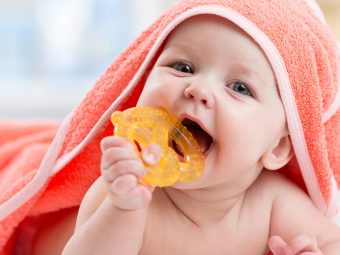
Pregnancy myths have been around since time immemorial. Whether it is talking about a fruit saying it can harm the baby or an eclipse that might cause problems to the fetus, myths can be found everywhere. But should you believe in them? Unless they have proper reasoning and evidence, you shouldn’t.
One of the most common myths that have been around is that you cannot exercise when pregnant as it will harm the baby. However, studies suggest otherwise. It has been shown that light exercise during pregnancy can help you have a healthier pregnancy and reduce complications. Read on to know more about such widely believed pregnancy myths.
Pregnancy Myths
While some of them have been ruled out completely, there are still some myths that have been doing the rounds for so many decades that we have simply come to accept these as true without attempting to discover the real truth behind them. Here we present you the top 23 widely-believed pregnancy myths and the real truth:
Myth 1: Belly Position Determines Baby’s Gender:
Chances are that any prediction your aunty or mother-in-law or any neighbourhood woman does will have a fifty percent possibility of coming true. Think about it. It has nothing to do with belly positions. Each woman carries her baby differently, and it all depends upon the body type and hip measurements. The gender of the baby most certainly has nothing to do with it.
Myth 2: Certain Types of Foods Will Affect the Baby’s Complexion:
This one is completely baseless. Your near and dear women try to push you into drinking too much coconut water with the sound advice that it will make you have a fair baby. Some old timers even go so far as to tell you to stay off iron supplements because they make your baby’s skin dark. First of all, food has nothing to do with complexion. Secondly, staying off iron supplements may lead to serious consequences both for the mother and the baby. Hence this is one myth you should completely disregard.
Myth 3: You Should Eat For Two:
No matter what anyone says, you do NOT need to eat for two. Yes, pregnancy does increase your daily caloric requirement, but only by 300 calories. This means just a single chapatti with ghee, or two servings of fruit, or two servings of salad extra. Not the kind of food bandwagon that is suggested to you just because you have another life growing within you.
Myth 4: Eating Spicy Foods Will Lead to Labor Induction:
No way. Eating spicy will only lead to heartburn and gases. Not labor induction as is told to you time and again. But to reduce discomfort from gas trouble, which may be even painful for a pregnant woman in delicate health, it is advisable to consume spicy stuff in moderate quantity.
Myth 5: More Heartburn Means More Hair on Baby’s Scalp!
The amount of hair on a newborn baby depends a lot on the genetic make-up of the child and not based on how much heartburn the mother suffers during pregnancy. The growing weight of the foetus, often leads to pushing the digestive apparatus upwards towards the cardiac sphincter, leading to acid formation. This is the reason for hyperacidity and not hair. Suffice it to say, many a women with terrific heartburns have given birth to hairless babies, and many women with nay heartburn have had children with heavy hairs on their heads.
Myth 6: No lovemaking during Pregnancy:
While most doctors may advise you to stay off from intercourse during the first three months, they all agree that during the second and third trimesters it is pretty much safe. Also, many women experience an increase in physical desire due to an increase in the hormone levels. Fetuses are protected by layers of tissues, and cannot be harmed by intercourse. So unless your practitioner has expressly told you to abstain from sex, please continue getting intimate with your partner.
Myth 7: Eclipses Can Cause Genetic Defects:
Cleft lips and palates are genetic anomalies and are caused due to certain genetic factors predisposing to it. They are more often seen in intermarriages. Under no circumstances are they related to eclipses either of the sun or the moon.
Myth 8: Spinal Anesthesia Causes Backaches:
While spinal anesthesia may contribute somewhat to backaches, they are primarily caused by the shifted center of gravity in pregnant women. All those weight an expectant mother carries causes the spine to curve excessively leading to awkward positioning and backache. Even women who deliver naturally suffer from debilitating backaches, and the only way to prevent it is by doing spine-strengthening exercises both during and after pregnancy.
Myth 9: Ghee for Easy Labor And Delivery:
Well-meaning aunties will tell you to consume ghee in copious amounts, supposedly because ghee lubricates the birth canal, therefore facilitating easy labor and delivery. This particular myth has no base whatsoever and having ghee in high quantity will only make you put on excessive amount of weight! The severity and duration of labor differs with every woman, and consuming ghee will not ease it in anyway. Castor oil is often prescribed by practitioners if labor is delayed, to bring on the contractions, but ghee is just an old wives’ tale.
Myth 10: Papaya Causes Abortion:
The basis behind this myth is that unripe or even semi-ripen papaya contains latex that can activate uterine contractions. However, to cause miscarriage, a woman would have to consume papayas in humongous quantity. Miscarriages often happen because of anomalies in a foetus, making it unviable for continuing. You can easily enjoy your favorite fruits and foods to your heart’s content, but before that always confirm your diet with your doctor.
Myth 11: Determining The Gender Of The Baby, According To The Intimate Position:
Many women may have heard of the ‘idea’ that the gender of the baby can be determined by the intimate position adopted. Well, the truth is, you can‘t determine the baby’s gender by intimate positions, as they have no impact on determining the gender of your baby.
Myth 12: Carrying Low Or High May Imply The Gender Of The Baby:
This is one of the most common myths associated with pregnancy-during this period, the woman’s body undergoes a lot of changes depending on the position of the foetus, muscle size and the fat deposited around her abdomen that shows the size and shape of a pregnant woman. There is no possibility of carrying high is a girl and carrying low is a boy, which is a common myth found circulating among many women.
Myth 13: Morning Sickness Can Determine The Gender Of Your Baby:
Morning sickness doesn’t determine the baby’s gender. Basically, morning sickness occurs due to a condition known as hyperemesis gravidarum. This condition is associated with a feeling of ‘sickness’ usually on an empty stomach or after intake of certain medications without the consumption of food. Morning sickness is in no way related to the gender of the baby.
Myth 14: Your Skin Becomes Dull During The Time Of Growth Of Your Baby:
It is a myth that is taking rounds for several ages now that when a women’s skin becomes dull during pregnancy it is because of the baby’s growth. This is not true. Your body does experience changes as the blood flow increase in all the cells. Many women experience glowing skin, popularly known as ‘baby-glow’ and some might not due to the nature of their body and hormonal imbalances. But there is no scientific fact supporting why some of the women do not get the ‘baby-glow’. Instead of concentrating on dullness and glow , women should be attentive in maintaining a healthy diet with proper exercises, to enhance their body strength.
Myth 15: Don’t Sleep On Your Back:
During pregnancy, sleeping on your back may slow down blood circulation in the body of your baby. But, till date there is no scientific evidence to support the fact that sleeping on the back could actually be harmful. The comfort and discomfort factors differ from woman to woman. Sleeping on your left side is advisable as it increases the blood flow to your lower body and back to the heart.
Myth 16: Avoid Raising Arms Above The Head While Pregnant:
This is yet another myth – it is believed that the umbilical cord may get wrapped around baby’s neck if you raise your arms above your head during your pregnancy period. However, there is no evidence to support the fact that raising your arms could actually cause the cord to get wrapped around your baby. So feel free to stretch, perform the sun salutation and hang on wet laundry too.
Myth 17: Pregnant Women Shouldn’t Bathe:
This may sound exceptionally funny, but yes, there are myths like these making rounds since quite some time. During pregnancy, given the hormonal changes taking place, bathing is even more important than other times. Taking a bath does not harm the baby or the mother in any way. However, care should be taken to cut down any possible risks- make sure that your bath water is not too hot since the raise in temperature may cause certain problems.
Myth 18: Stress Is Bad For Fetus:
Most of us believe that taking any form of stress during pregnancy is bad for the fetus. But recent research shows that taking the moderate stress is good for the fetus. It accelerates the development of the baby and tones up the fetus nervous system. Infants of mothers who experienced a moderate level of stress have faster working brains than mothers without stress. Also, toddlers have higher mental and motor skills born to stress experienced mothers.
Myth 19: You Should Not Eat Sweets:
Chocolate is a big exception. Studies reveal that pregnant women who have chocolate regularly will have babies who laugh more often and show less fear and smile. Also, pregnant women who will eat chocolate five and more times in a week during the third trimester have 40% less risk of experiencing high blood pressure.
Myth 20: You Should Stay Away From Seafood:
Another false statement. Eating lots of fish high in omega-3’s gives you smarter kids. According to a study, kids whose mothers had at least 12 ounces of seafood a week had higher IQ, communication skills, social and superior motor skills.
Myth 21: Expectant Mothers Feel Happy When Pregnant:
In reality, it is not true. Pregnant women suffer from mood swings like any other women. About 20% of pregnant women will experience anxiety and depression. Falling under depression during pregnancy will increase the chances of premature deliveries or low birth weight.
Myth 22: You Should Stay Away From Your Pet:
It is not true. But, you should not change your pet’s litter box as it can cause the risk of toxoplasmosis infection. You can, however, cuddle your pet and it costs nothing.
Myth 23: Flying Will Increase Complications:
Not True. It is false again. You may worry about the airport body scanners, X-ray machines and radiations from flying can affect your pregnancy. But the kind of radiations will not penetrate much into the body. So, therefore they are unlikely to affect the fetus. However, it is not advisable to fly during the third trimester because there are chances you may deliver en route.
Most first time moms tend to fall prey to these silly myths, and might make attempts to tackle them, which may actually be dangerous for the baby.
Many may start offering advice once they hear the news of your pregnancy. Though most suggestions are given with the best intentions, some may not be from reliable sources and may be pregnancy myths. For example, myths such as eating spicy food can induce labor, a pregnant woman should eat for two, and morning sickness can decide the gender of the baby do not have scientific explanations. Moreover, spreading such myths may cause unnecessary anxiety and fear during pregnancy. Hence, cross-check any suggestions you receive with your doctor for the best guidance.
Frequently Asked Questions
1. What can I do to make my baby intelligent during pregnancy?
Several scientific studies have shown that having a well-balanced diet (rich in iron, omega-3 fatty acids, folate, and other essential nutrients), being physically active, and listening to soothing music could aid in developing the fetal brain and its function (1) (2) (3). Also, many other factors are responsible for a baby’s intelligence that doesn’t depend on the mother.
2. What should you not watch when pregnant?
Experts recommend that you avoid watching dramatic or painful birth stories or reality television shows (that lack credibility), as it might negatively influence your mind and childbirth process 4.
References
- Michael K. Georgieff et al. (2019); Nutritional Influences on Brain Development.
https://www.ncbi.nlm.nih.gov/pmc/articles/PMC6045434/ - Marlos R. Domingues et al. (2014); Physical Activity during Pregnancy and Offspring Neurodevelopment and IQ in the First 4 Years of Life.
https://www.ncbi.nlm.nih.gov/pmc/articles/PMC4211660/ - Wolfgang Mastnak; (2016); Perinatal Music Therapy and Antenatal Music Classes: Principles Mechanisms and Benefits.
https://www.ncbi.nlm.nih.gov/pmc/articles/PMC6265611/ - Ann Luce et al. (2016); “Is it realistic?” the portrayal of pregnancy and childbirth in the media.
https://bmcpregnancychildbirth.biomedcentral.com/articles/10.1186/s12884-016-0827-x













